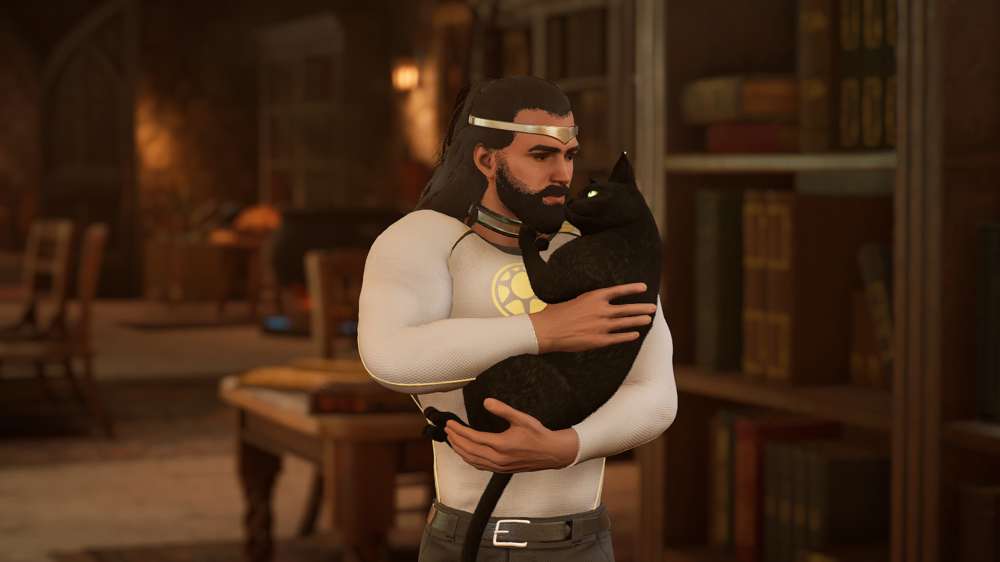Marvel's Midnight Suns Review "Clever, Tactical Turn-Based Fun"
Check out our full review for Marvel's Midnight Suns, the new tactical role-playing game from Firaxis.

Fairly early into Midnight Suns, the combat clicked for me in that satisfying way that tactics games often do. I was pouring over my cards and analysing the enemies on the battlefield, before having a big-picture moment and seeing the exact play I needed to make to win the encounter. It was an important eureka moment where I came to understand exactly what Firaxis was aiming for with the card-based combat, and it made me fall in love with the type of quick-fire, flowing tactics that the game pushes you to fall into the rhythm of. I just wish the whole game made me feel this way, because the rest of the experience doesn't quite match.
A Supernatural Marvel

Midnight Suns is a tactical RPG from Firaxis, who are notable for the Civilization and X-COM series, with the same team and director from the latter taking up the reigns here. It takes place in the Marvel universe (separate from the MCU and other Marvel games) where Hydra resurrects an evil sorceress called Lilith, the mother of demons.
With Lilith presenting an omega-level threat to Earth, various superheroes team up to help stop her, but her power quickly becomes apparent and Doctor Strange suggests reviving an ancient superhero called the Hunter who defeated her once before. The Hunter is also you, and you get the chance to customise their looks and control them when you're outside of combat encounters.
From here, you join up with a team of 13 superheroes from groups like the Avengers, X-Men, and Runaways, to stop Lilith and save the world. There's a strong balance to the roster of heroes, mixing popular heavy hitters like Iron Man and Captain America, with less-known, supernatural heroes like Magik and Nico Minoru. This also makes for a good representation of powers from different corners of the Marvel universe.
The story is fairly simple, but it becomes more engaging as you explore the history of Lilith and your relationship with her as both child and mortal enemy. While not a new concept, the game does have a lot of time to flesh it out, and dream segments give you a chance to speak to her one-on-one at specific points. The ending doesn't quite stick the landing and the vagueness of Lilith's goal is highlighted as something that could have been explored more beforehand, but it's far from the worst the writing gets in Midnight Suns.
Fighting With My Family

For the most part, Midnight Suns is split into two very different experiences: combat and the Abbey. Since this game's first announcement, it's been seen as X-COM with Marvel characters, and while there are some obvious inspirations from the series, this couldn't be further from the truth. Midnight Suns swaps out random chance to hit with the randomness of cards, and while there were some worries about how this would play out, it actually makes for an incredibly fun system.
Each mission you go on allows you to take three heroes, each with their own unique deck of eight cards that you can choose beforehand. There are attack cards for performing attacks, skill cards for support and utility-based actions, and heroic cards which let you perform special attacks or skills for heroism points. You start combat with a random selection of cards from the three combined decks, then you're presented with your first turn, where you get to figure out the puzzle of how to defeat your enemies and meet your objective.
In my experience, it was very rare that I couldn't really do anything with the hand I received, and through clever deck-building, and really engaging with the various mechanics like environment attacks, redraws, and combat items you can employ during battle, there's always a way forward. It focuses more on short-term thinking than something like X-COM and instead of planning for three turns ahead, you have to think about how much you can possibly exploit your current turn to meet your goals. It's different and certainly more accessible, but there's still tonnes of room for making tactical decisions and hard choices about how you're going to make the best out of your situation.
It's also worth mentioning how viscerally satisfying the combat can be. While there's a lot to enjoy here when it comes to making tough decisions and finding a solution to help you win the encounter, it's also a blast to watch unfold. Midnight Suns may not have the greatest graphics up close, but in combat, everything comes together really nicely. Heroes animate well and carry some personality in their moves and attacks, hearing the KO noise as an enemy is launched into a concrete wall is forever gratifying, and there are some visually striking particle and explosion effects when terraforming the battlefield with more powerful attacks.
Combat is easily the highlight of the whole game, and it's clear that Firaxis put a lot of thought into balancing the accessibility with the more cerebral nature of tactical gaming. It's a good example of how a developer can try to reach a more broad appeal without sacrificing what makes them different. If Midnight Suns was purely built around combat and preparing for it, I could conclude this as an overwhelmingly positive review, but there's a whole other half of the game we need to talk about.
The Whole Other Half Of The Game

The Abbey is a hub world where you will spend your time not in combat missions, and this is where the game focuses more on role-playing mechanics, as a lot of it is based around interacting with the other characters. It also acts as your base of operations, giving you different ways to prepare for combat, and there is some exploration where you can gather collectibles, complete side quests, and gain resources.
It's split into daytime and nighttime sections, with your mission for the day taking place between. During the day is when a little more of the X-COM formula leaks in, as you are able to spend time earning cards and purchasing upgrades in the forge, spar with heroes and improve cards in the training yard, and send heroes on side missions at C.E.N.T.R.A.L. This stuff is great for the most part, and there's a satisfying progression as you begin to build more unique decks for heroes and gain upgrades that give you more options in the field.
Abbey life when you're not preparing for missions is where the game mostly lost me. Regardless of the time of day, when you're at the Abbey you can speak to and get to know the various characters, and there's a whole friendship system built around these encounters. Selecting dialogue options characters like, spending time hanging out with them, complimenting them, and taking them on missions will improve a character's friendship level with you, and as you level up they gain passives, and eventually, you gain access to their legendary card. In theory, this system is great and allows you to get up close and personal with the vibrant personalities of Marvel, but in practice, it's not very enjoyable.
The writing in this game suffers a lot from the typical tropes of Marvel films, and after 15 years of the same homogenous style, it quickly gets old. The snarky jokes that undercut any tension or moments of reflection can be okay in the vacuum of a two-hour blockbuster, but when it's ever-present for a 60-hour game, it becomes far too much. It's especially tedious when the writing stands in stark contrast to the more unknowable and supernatural aspects of the story that even explore Lovecraftian themes, turning any real stakes into a joke. It's worth pointing out that if this style of writing clicks with you, then you may not face the same problems here, and there are still a few characters that suffer from these problems much less, such as Scarlet Witch.
Perhaps the game's biggest problem is that it punishes you during the best parts for not fully engaging with the worst parts. Interacting with characters is a big portion of the game, and it rewards you in combat by giving heroes passives, rewarding you with new cards, and unlocking legendaries. So if you choose not to engage with this, you'll be left with a lesser experience, but tackling this stuff also ruins a large part of the playtime anyway. It's clear Firaxis wanted to aim high and really deliver a Marvel superhero experience in more ways than one, I just wish it didn't have to hamper the game design that they mastered years ago.
Divinity War

Despite being an uneven experience, Midnight Suns is ultimately still a good game that's worth a try for tactics and Marvel fans. The tactical turn-based combat makes for some of the best times you will have gaming this year, thanks to a viscerally enjoyable style, steady learning curve, and lots of strategic depth. It's just sadly held back by incredibly generic writing and poor role-playing mechanics that sullies a good half of the experience.
3.5/5
Reviewed on PC. Code provided by publisher.
Comments

